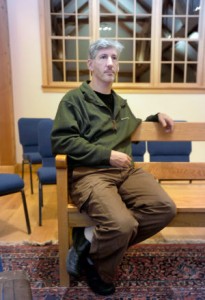Dr. Joseph Olejak, a chiropractor with a successful practice in Delmar, is spending his weekends in Columbia County Jail for the next six months.
On Oct. 17, Judge Thomas McAvoy of the Federal District Court of Northern New York found Olejak guilty of the charge of willful failure to file an income tax form, something the defendant had failed to do for nearly 20 years.
He was sentenced to 26 weekends in jail and payment of $240,000 in back taxes. In addition, he’s doing community service at the Northeast Regional Food Bank, and is looking for other placements as well.
Olejak, a Quaker, withholds taxes because he’s a passionate opponent of war.
“Quakers believe there’s an inner light in everybody,” he said. “If we believe that, it’s morally wrong to snuff it out.”
McAvoy, Olejak said, “acknowledged my Quaker faith,” but also said there were three reasons he would have to be incarcerated.
First, to prevent others doing the same thing.
Second, to rehabilitate the defendant.
And third, to prevent the defendant from repeat-offending.
“He was sensitive to the basic principles behind what I did,” Olejak said. “He was lenient in the sentence he gave out. I could have spent three years in a federal prison somewhere.”
He was allowed the five days of freedom a week in order to continue to support his children.
Olejak’s life changed in 1994 when he saw a TV news interview with then-U.S. Secretary of State Madeleine Albright.
News reporter Leslie Stahl told Albright that half-a-million children had died due to the Clinton Administration’s withdrawal of economic aid to Iraq during the sanctions. Stahl asked her if it was worth it.
“Without skipping a beat, Madeleine Albright said, ‘Yes, it was the right choice,’” Olejak said. “I was so morally outraged. My government created a monster (Saddam Hussein), and then we punished the children when we couldn’t get the monster out.
“Nobody talks about how (Donald) Rumsfeld and Reagan put Saddam in power,” he said. “They funneled money and chemical weapons to Saddam to fight the Iranians, because we put a dictator in Iran.”
Despite his moral outrage, Olejak said as a peaceful person he was not going to do anything violent.
“The only thing was nonviolence,” he said, “and the logical thing was to withhold money.”
His approach was influenced by his admiration for the resistance to injustice and tyranny in the lives of Gandhi, Martin Luther King Jr. and Nelson Mandela.
“We need to do something in this country about war,” Olejak said. “We take whatever we want, and that’s wrong.” As we get older, we pay into a system in which 60 percent of the taxes go to “taking whatever we want,” he said.
“It’s a problem because our kids will no longer have 15 to 18 kids in their English classes,” he said. “The money could have gone into health, education and welfare, instead of plowing it into stupidity.”
Since 1994, in protest of the wars and sanctions leveled against Iraq and Afghanistan, Olejak has withheld all his taxes. That made his case criminal instead of civil in nature.
“That was my mistake,” he said. “I should have filed my tax forms, withholding 60 percent. I had plenty of people saying, ‘Don’t do this,’ but I was thickheaded — I couldn’t get the images out of my mind. I thought to myself, there’s no way I can get back in the system; it’s unconscionable.”
Once Olejak’s time is served and his fine is paid, where does he go from there?
“My dilemma is, ‘What do I do afterwards?’” he said. “I’m still a Quaker, I still believe in peace and nonviolence. This question of whether we’re going to continue to pay for war is equal to the Emancipation Proclamation. We need to create a situation where we work things out with words, not bombs.”
Now, Olejak’s solution to the problem of taxes and war is simple: He proposes a “peace tax,” which would not fund war-related items.
“People need an opportunity to pay taxes for something they can feel good about,” he said. “You could choose, regular taxes or peace taxes. What better way is there to promote democracy than that?”
Meanwhile, he’s promoting democracy by serving his sentence. At 6 p.m. every Friday he reports to Columbia County Jail; at 6 p.m. every Sunday, he is released, in order to be at work the next morning.
Olejak called jail “an extremely humbling experience. Every need is supplied by someone else, with the exception of the thoughts in your mind.”
The good thing about being confined to a nine-by-nine cell with just a toilet, sink, writing table and bed for 48 hours is that it provides “a lot of time for reading, quiet meditation and reflection,” he said. “From the moment I went in, I didn’t experience anxiety, because I know why I’m there. I made a conscious choice to do what I did. I knew there would be consequences, and I am willing to accept them for the greater good.”
The first weekend, he said, was rather long.
“I wasn’t used to the lack of stimulation.”
The second weekend he settled right into reading and writing, and it went much faster, he said.
But coming out of jail, he said, “is like being five again. I ran to my car: To feel my legs was delightful.”
